 |
 |
 |
 |
 |
 |
Ending or not, that felt like a fitting conclusion.
Without a doubt, coming into the season I viewed Subete ga F ni Naru as the appetizer for NoitaminA mystery, with next season’s Boku Dake ga Inai Machi as the main course. I still feel Boku Dake is going to be the real masterpiece if they don’t screw it up, but Subete no doubt represents a success for NoitaminA and for A-1 Pictures (which has become its de facto house studio). This is a show that belongs on NoitaiminA, and one we very likely wouldn’t have gotten without it – and that’s the kind of anime I really want to see on the block.
Right up to the end The Perfect Insider was a very effective combination of intriguing mystery and even more intriguing characters. I’ve seen it said that the cast of this series is more interesting than they are likeable, and that’s probably true (though I do rather like Souhei), but that’s fine. It ties in very neatly with the view I’ve espoused before, that it’s not necessarily the job of fiction to make you feel good so long as it makes you feel.
I like the fact that despite its short length (as usual per NoitaminA even shorter than the typical one cour) Subete ga F ni Naru still chose to wrap up the major plot points in the penultimate episode and use the finale as a coda – a time to reflect back. It’s an approach I dearly wish more series would take but few do. And it especially suits this series that was always more about the way the mystery impacted the behavior of the characters than it was about the mystery itself.
But I suppose in talking about the final episode one must begin by asking just exactly what happened in it. And as is usually the case with this show, much of that it left to interpretation. I think we can say with reasonable certainty that Magata Shiki in the flesh did come and speak with Saikawa-sensei. That conversation was one of the highlights of the episode – Souhei slipping into schoolboy nervousness around the woman he misguidedly sees as some sort of icon. I suppose the naysayers will dismiss most of it as self-absorbed navel-gazing – but where else in anime are you going to hear talk of how people don’t fear death, but the kind of life that leads to it? How death is the norm, and life itself the exception (true, when you think about it) – the “illness” curable only by death?
What happens after that conversation, though, is much less clear. Shiki seems to turn herself in to the police who’ve been guarding Souhei – but later we learn she was tracked to Tokyo. Did she outsmart the cops and escape again, or did something more metaphysical happen? And at the very end of the episode, she seems to be riding through the desert on a camel with her daughter, and her uncle shows up. The implication here is that she’s finally found her freedom and gone over to the other side, but she could just as easily be in the same VR network we saw her in earlier. If indeed she’s dead, how did that come to pass? Shiki states quite clearly that she wishes to be killed by someone else rather than killing herself, but who would have been left to show their “love” for her by doing so?
Then we have the conversation between Moe and Souhei, which is also fairly ambiguous but certainly implies that Souhei is ready to take his relationship with Moe to the next level. He reveals that Setsuko is in fact his little sister, and makes what sounds very much like a commitment to Moe. This is another of the best scenes in the episode, with Moe wrangling with her puzzlement at Souhei’s fascination with Shiki’s warped worldview and Souhei continuing to toy with her gleefully, if affectionately. I’m still not sold that this is a romantic relationship that can go anywhere, but there’s certainly a strong emotional connection between this two – and who knows, maybe that’s something that can be built around.
In the final analysis I don’t think Mori Hiroshi is attempting to give us any answers or judgments with Subete ga F ni Naru. Call it existentialism, call it nihilism, but I think the perspective of this series is decidedly fatalistic. It’s not that Mori is endorsing Shiki’s twisted morality – anything but. Rather, I think he’s saying that in an existence that’s ultimately devoid of any underlying meaning or universal morality, people cope with that void in ways that are unique to them. If there is any kind of larger truth in his universe it’s that one must live (and die) in a way that’s true to who they are, and perhaps there is a kind of grudging admiration for Shiki’s abhorrent choices in that. I don’t buy that way of thinking for a moment, but it makes for a fascinating character study.
I’ve been comparing this series to Murakami Haruki (whose works I still think would make wonderful anime) since the beginning – and I’m far from the only one. While the comparison isn’t perfect, I think there is some of that same feeling of watching the characters like rats in a maze – seeing them faced with bizarre and often fantastical events and being forced to react to them. Both Mori and Murakami are fundamentally surrealist writers who focus on human psychology – the strange places the mind goes to when the lines between reality and fantasy blur and disappear.
Anime certainly needs more shows like Subete ga F ni Naru – ones which dispense with tropes for the most part and challenge the audience to think hard about what they’re seeing and hearing. Mystery is not anime’s strongest genre it’s true, but this series soars above the typical anime mystery – and mystery is less important to its essential nature than character interplay. It’s shows like this that make me glad that NoitaminA is still around, and still able to occasionally take commercial risks – and that make me wish it was still an hour long.
 |
 |
 |
 |
 |
 |
 |
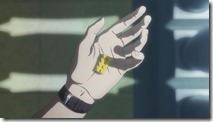 |
 |
 |
 |
 |
 |
 |
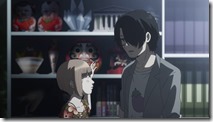 |
 |
 |
 |
 |
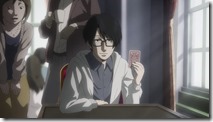 |
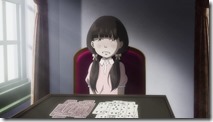 |
 |
 |
 |
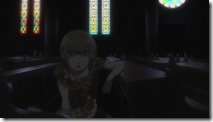 |
 |
 |
 |
 |
 |


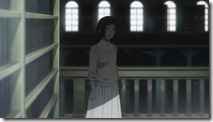

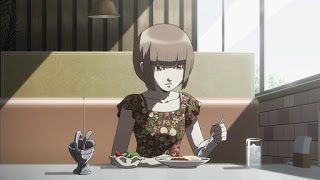
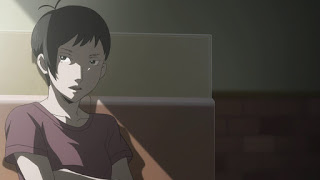
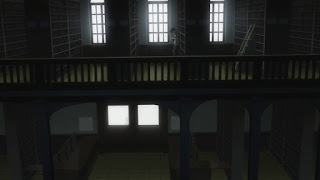
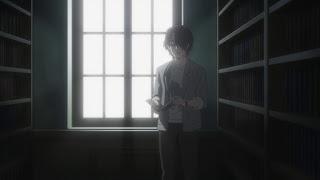
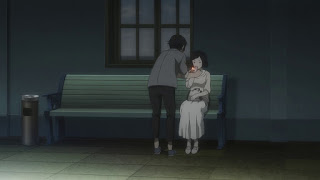

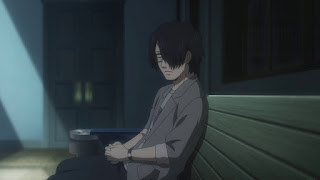



Antony Shepherd
December 18, 2015 at 9:11 amYep, agree with every word there. This for me has been a highlight of the season.
Definitely the most 'Noitamina-ish' Noitamina show for some time.
I'd love to see more adaptations of Mori's novels about Souhei and Moe, because we do need more shows like this. Sadly I suspect commercial considerations will mean this never happens, which is a crying shame.
sonicsenryaku
December 18, 2015 at 9:58 amill say this; one of my glaring issues with the way the narrative handles magata shiki's character is that it tries to sell shiki as some sort of human being whose this intellectually complex individual, but nothing she does ever really convinces me of that and that's usually a pet peeve of mine when it comes to storytelling: when a narrative tries to make a character seem like something that the viewer themselves cannot infer based on their actions in the story.
A part of me wants to forgive the writing in that regard because this accusation seems to be an opinion that mostly comes from souhei's twisted fascination in shiki. I guess we're supposed to understand that souhei is just romanticizing a homicidal woman that he cant figure out and as a result, explicate souhei's own twisted mentality. I would be more forgiving if that was the case, but the show itself also tries to make shiki seem like this complicated individual with unfathomable depth. Unfortunately, there is none as she doesnt come off as, well, a character and in a story such as this..your "villain" should feel cohesive and immerse you into his/her mindset, but it doesnt.
Again, maybe that's the point: for shiki to be nothing more than a representation of the killer with seemingly purposeless motives; the kind of killer you ask yourself: "why would anyone do such a thing?" Because in the real world, sometimes we never get those answers. Perhaps souhei is just convinced that people like shiki do have motives but because their mindset is well beyond ours, we can never understand. It's a pretty unhinged way of thinking, but maybe that's what we are supposed to take from souhei's fascination of shiki; not that he's right, but that his viewpoint is one that some people believe to be true. If that's the case then that's a very intelligent angle for the story to take, however, the way that it goes about it is not as intelligent and so the narrative feels misguided at times. But perhaps that's where interpretation comes in. Sigh…what a flawed series…but one that is kind of interesting to think about in some of the themes it presents. I would like to see more series like this in the future, but ones that handle core themes such as this with more sophistication
Earthling Zing
December 19, 2015 at 3:48 amI don't think Shiki is supposed to mean to little, with so many scenes devoted on her(even the ending scenes!) it seems like the writer wants us to think she is pretty complex at least. But that part doesn't entirely fall flat on me anyway, to me she seems like someone pretty bored of this world, experimenting with having multiple personalities and such, the fact that she's interested in Souhei, something which I can kind of relate to makes me suspect shes not as crazy as she seems.
sonicsenryaku
December 19, 2015 at 4:31 pmyeeeeaaaaa, im just not buying it. Like you said, the writers tried but i personally dont think it was constructed well enough to give the viewer the sense that shiki is this woman in her right mind who far surpasses the intellect of her cast members. It comes off as artificial and i dont like when a story does that.
Earthling Zing
December 20, 2015 at 8:45 amIts really difficult to write a superintelligent being so I do give the writers some slack in that regard ^_^'' The last one I found pretty realistic might be Doctor Manhattan from Watchmen.
Gary Cochran
December 18, 2015 at 7:19 pmAs I said over on RC…
I hope the makers are not looking for healthy DVD sales when they come out. This is not the kind of series you watch as it airs and then can't wait to own the DVDs when they come out so you can watch it all over again.
Jay Psi
December 19, 2015 at 3:17 pmIronically for a Noitamina series, this would have been better served in fewer, longer episodes. The live-action episodes covering this material was more engaging and focused, and Saikawa/Moe were presented as both interesting and relatable (there is nothing wrong with preferring one over the other, but if I'm given both that's what I will take). Alternatively, you could argue that we needed much more of Shiki's point of view which were held back (perhaps wrongly) until the last scenes of most episodes.
Having said that I appreciate Subete as both a return to the "roots" of Noitamina and as an appetiser for BokuDake if nothing else. But it fell on the wrong side of the explanation-interpretation continuity for me to remember the series with a significant fondness.
Blueicegal ♥
December 19, 2015 at 10:41 pmWho would actually buy this. I mean I continued with the series because I was waiting for it to all make sense but at the end of the day he's a delusional man who wants to tell himself there's so much to this crazy killer than anyone else can ever comprehend. He seems to romanticize the idea of her and it's so creepy. At the end of the day she just wanted to be free and she was willing to do whatever it took. Moe is just young and stupid if I was her I would have ran a mile away from him by now because I don't think he will ever stop thinking about Shiki – and who knows what he will become or do in the future.
melodic thoughts
December 24, 2015 at 3:42 pmI think as Magata Shiki says herself, she perceives things with many eyes. Thus, when she told Saikawa she wanted to be "killed" by someone else – isn't it how love is like – I almost believed her, up to the point where it was revealed it was a lie. There had been many facets to her – the one who was talking to Saikawa all this while may have been Magata Shiki, but there are others within her who collectively make decisions.. This is how I would explain her escape anyway.
My favourite scene was the one of Magata Shiki and her daughter – it felt especially creepy given that we now know Magata Shiki had tried to get her daughter to kill her. Considering that they have never been out of the laboratory, this can only be within the VR system, and it makes me wonder… does the daughter ever manage to see at least an image/visualization of her dad?
I agree that the characters are more interesting than likeable. This is a show which raises very interesting topics, but I'm not so sure if it is one which leaves a deep impression over the long run.